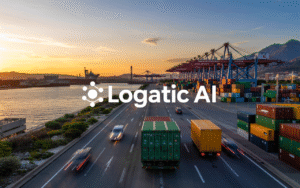https://theworldfinancialforum.com/participate/

In an era defined by rapid delivery expectations, supply chain disruptions, and the race toward sustainability, the logistics industry is undergoing a major transformation. At the center of this change is Logatic AI, a new-generation logistics intelligence platform that’s reimagining how goods move across the globe.
Rethinking Logistics with Artificial Intelligence
Logatic AI combines cutting-edge artificial intelligence, real-time analytics, and automation to streamline every aspect of logistics—from predictive inventory management to last-mile delivery optimization. Designed for flexibility and scale, it empowers companies to reduce costs, increase delivery speed, and make smarter, data-driven decisions.
Rather than functioning as a standalone tool, Logatic AI acts as an intelligent layer across the logistics stack. Its platform plugs into existing ERP systems, sensors, vehicle fleets, and cloud platforms, learning from vast streams of structured and unstructured data to enhance operational performance.
What Makes Logatic AI Different?
While many logistics solutions offer automation or analytics, Logatic AI stands out by delivering a fully integrated AI system that learns and adapts in real-time. Here’s how it’s changing the game:
Smart Routing Algorithms continuously optimize delivery routes based on real-time traffic, weather, and package priority.
Demand Forecasting Models use historical trends and market signals to minimize overstocking and stockouts.
Warehouse Automation Tools coordinate with robotics and IoT devices to speed up order fulfillment and reduce errors.
Global Supply Chain Visibility tools offer live dashboards and alerts for shipment tracking, customs delays, or disruptions.
Carbon Emission Optimization allows companies to track and lower their environmental impact through better route planning and packaging.
Whether you’re an e-commerce platform handling millions of daily orders or a manufacturer coordinating complex supply chains, Logatic AI offers powerful tools to stay ahead.
Real-World Use Cases
Logatic AI’s modular architecture means it can be tailored for various industries. For example:
Retail companies use its demand forecasting to better manage inventory across stores and distribution centers.
Pharma & Cold Chain Logistics benefit from AI-driven monitoring of perishable shipments to ensure temperature compliance.
3PLs and Fleet Operators deploy its smart dispatching tools to maximize vehicle utilization and reduce fuel consumption.
Each module can function independently or as part of a larger automation ecosystem—making it ideal for both startups and global enterprises.
Core Technology
Logatic AI’s platform integrates machine learning, predictive analytics, and real-time data streams to manage logistics workflows from warehousing and inventory to fleet coordination and last-mile delivery. Key capabilities include:
AI Route Optimization – Dynamically selects optimal routes based on traffic, weather, and delivery constraints.
Demand Forecasting – Uses historical and real-time data to predict inventory needs and reduce stockouts.
Warehouse Automation – Coordinates robotics, sensors, and AI to streamline picking, packing, and fulfillment.
Supply Chain Visibility – Real-time tracking and anomaly detection for shipments across global networks.
Carbon Emission Tracking – Helps logistics firms monitor and reduce their environmental footprint using AI-optimized planning.
Riding the Wave of AI Logistics
The global logistics automation market is booming—expected to surpass $120 billion by 2030. Companies are hungry for ways to overcome labor shortages, cut costs, and future-proof their operations. Logatic AI is tapping into this surge by offering a platform that’s not only powerful, but practical.
With pilots reportedly underway with top logistics firms and e-commerce platforms, the company is steadily positioning itself as a category-defining player. Strategic partnerships with cloud providers and ERP vendors are likely to accelerate its adoption globally.
Logatic AI’s mission goes beyond automation—it aims to make supply chains intelligent, adaptive, and resilient. By delivering real-time insights, automating critical decisions, and reducing environmental impact, it’s helping organizations modernize for a new era of logistics.
As the world becomes more connected and expectations around speed and sustainability rise, companies that invest in AI-first logistics will be the ones that lead. Logatic AI is helping them get there—one smart shipment at a time.
You might enjoy listening to AI World Deep Dive Podcast: